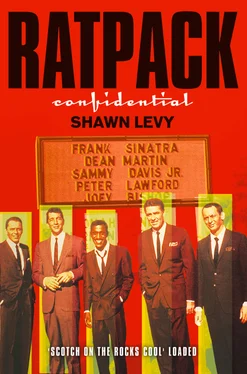Grow up with immigrant parents and a last name that no one can pronounce right, with an ear mangled by a midwife’s forceps and no meat on your slight bones, with no brothers or sisters, and a mother always on the go, and a queer little dream that you can win the whole world over with a song; grow up with all this, and then win wealth and fame and acclaim and power—the whole world and more—and you’ll likely find no embarrassment in living as if your every action was the stuff of legend.
Throughout his life, Frank would be boosted in his perception that his progress through the world was of great import, and if he ever lapsed into doubt, there would always be someone around to reassure him: a wife, a dame, a publicist, a thumbbreaker, a daughter, a fan, even, though not quite so reliably, the press. Frank could count on being spiffed-up, spoiled, spirited out of jams; he expected it of life. And it was an expectation born not in the flush of his success but in the earliest days of his youth: Of all the hangers-on, sycophants, yes-men, and boosters, his mother was first and foremost.
There was undeniable steel in Natalie Garavante, the little pug-faced Genoese firebrand known to everyone in Guinea Town, Hoboken, as Dolly. She prodded the men around her to let her through doors that she herself would’ve battered down in a world that cut women an even break. She had a stunningly foul mouth: “Her favorite expression was ‘son of a bitch bastard,’” recalled a mayor of Hoboken who knew her in his youth; a mob lawyer who met her in the 1960s compared her way with profanity favorably to Jimmy Hoffa’s. She made the slow-moving Italian men around her jump at her command, and she carried enough clout to get political bosses and city officials to do the same. She was a shit-stirrer and a hollerer; she worked hard and she took no prisoners; she spoke simpatico with the people in the streets and defied the men of power. If she’d’ve been born a boy, she might’ve been an Italo-American Huey Long.
But she was a woman and it was the 1910s—and an Italian neighborhood at that—and so she had to find a husband, and she settled on a handsome, illiterate kid from the neighborhood, a guy who couldn’t hold a steady job but cut a dashing figure in the boxing ring. Dolly’s brothers were boxers, which was probably how she came to meet Marty O’Brien, a stout, quiet little guy with tattoos on his arms. Maybe she first took him for Irish, which would’ve appealed to her social-climbing instincts; soon enough, she learned he wasn’t an O’Brien but a Sinatra, but that didn’t make him any less attractive. He might’ve been an unfinished project, but Dolly was sure she could make something of him. Despite her parents’ fears of a layabout Sicilian for a son-in-law, they eloped and married in a civil ceremony. A year and a half later, she bore their first and only child.
Later on, he would try to depict himself as some kind of Dead End Kid turned good, but the truth was that Frank was always plushly seen to. In a neighborhood where the men worked menial jobs and the women raised broods of five, eight, ten brats, only-child Frank had two working parents and a surfeit of candy, toys, bikes, clothes. The homes in which he grew up were the finest to which Italians in Hoboken could aspire. A lot of the Sinatras’ neighbors on the tony streets on which they lived didn’t even know they were Italian: Marty ran a popular speakeasy under his boxing name, and Dolly routinely introduced herself as Mrs. O’Brien; when Frank’s buddies wanted to tease him about his Little Lord Fauntleroy wardrobe—he had his own charge account at Geismer’s department store—-they dubbed him Slacksey O’Brien. They were a family on the rise; a local newspaper society page reported on a New Year’s Eve party Dolly threw after they bought a grand home at the height of the Depression.
By then, Frank had revealed himself as a perfect mix of his parents’ temperaments. Hotheaded and ambitious on the one hand, he liked to loaf and schmooze and was an indifferent student on the other. For all that he inherited from his parents, he was, typically, embarrassed by them as well. Marty was no world-beater, everybody knew that, and he seemed pronouncedly meek even among his friends and colleagues; Dolly was outrageous, flamboyant, earthy, loud, an unignorable commotion whose affectations and ambitions grated on as many people as they inspired. Worse yet, she was the neighborhood abortionist, known to all the Italian girls as the person to turn to when they were in trouble; Frank’s ears would turn red whenever he heard people talk about his mother the “rabbit catcher.” Like everyone else, he was attracted to Dolly’s exuberance, but like Marty and the other men in the family, he feared her. “She was a pisser,” he’d say later, “but she scared the shit outta me. Never knew what she’d hate that I’d do.”
As if to erase the shame Dolly put him through—the dudish threads, the mortifying secret work, the rowdy spectacle she made of herself on nights out with the girls—Frank seemed, at first, to take after Marty. He dropped out of school; he couldn’t keep even a menial job; and he took up a fancy even less promising than Marty’s boxing: Smitten with Bing Crosby, he wanted to be a singer.
At the sight of her boy sporting a yachting cap and crooning in a mirror, Dolly was, as her parents had been by Marty, disgusted, but the idea of denying her boy something that he wanted was worse. She bought him a spiffy electric P.A. system and convinced acquaintances to let him sing in their saloons and restaurants; eventually, she used her clout to get him a job chauffeuring a rising local trio, the Three Flashes, who were preparing to make a few movie shorts for Major Bowes, the era’s great promoter of amateur showbiz talent; with his mom’s backing, Frank quickly rose from driver to jester to full-fledged singer in the group.
The older guys in the act, which Bowes redubbed the Hoboken Four, didn’t care much for the mama’s boy in the midst, even less so when Frank’s singing improved and his solos became a centerpiece of the show. During a several-month nationwide tour as part of one of Bowes’s traveling road shows, they began picking on the skinny kid, beating him up when they felt he needed to be taken down a peg. Frank quit and returned to Hoboken—where Dolly had salted the press with news of his successes.
Three years of scattered, aimless work followed, then a steady job—singing waiter at the Rustic Cabin in Englewood Cliffs, a roadhouse which had a broadcast wire to New York’s powerful WNEW radio station. In June 1939, bandleader Harry James heard Frank on the radio and drove out to see whose voice that was. Shazam: Frank was in. James signed him, they hit the road and cut some records, and Frank got a little bit of notice. In December, Tommy Dorsey auditioned him and he left James with a handclasp and best wishes.
This wasn’t just the call of Lady Luck or the reward of sheer ambition. Somewhere sometime in there, a miracle bloomed. Frank’s voice went from pleasant to stunning: a beautiful, tender instrument possessed of uncanny rhythmic sense and breath control, one of the great talents of the century, a gift no more explicable than those of Joyce and Picasso, recognizable as such even in its juvenile state. Everyone who heard him for the first time was staggered.
As a member of the Dorsey orchestra, Frank became famous: hit records, magazine covers, appearances in movies, flattering press. Like he’d learned from Dolly, he milked it, aggressively courting the press, disc jockeys, anyone he thought could boost his career. He spent more than he earned on his wardrobe alone (he was so finicky about his personal cleanliness that his bandmates with Dorsey nicknamed him Lady Macbeth). Within three years, he was convinced that Dorsey was holding him back from a career that would rival Crosby’s, and he left—after months of bitter, petty infighting, a lucrative settlement, and a grudging goodbye.
Читать дальше












